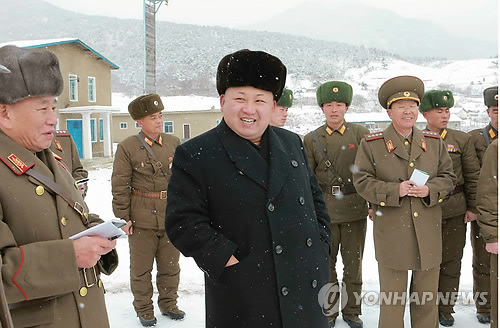- California Assembly OKs highest minimum wage in nation
- S. Korea unveils first graphic cigarette warnings
- US joins with South Korea, Japan in bid to deter North Korea
- LPGA golfer Chun In-gee finally back in action
- S. Korea won’t be top seed in final World Cup qualification round
- US men’s soccer misses 2nd straight Olympics
- US back on track in qualifying with 4-0 win over Guatemala
- High-intensity workout injuries spawn cottage industry
- CDC expands range of Zika mosquitoes into parts of Northeast
- Who knew? ‘The Walking Dead’ is helping families connect
China not invited to 3rd death anniversary of Kim Jong-il

This photo released by Rodong Sinmun on Dec. 5, 2014, shows North Korean leader Kim Jong-un visiting the North Korean military’s Unit 1313 to inspect its winter training. (Yonhap)
BEIJING (Yonhap) — China is unlikely to send a delegation to next week’s third death anniversary of North Korea’s former leader, Kim Jong-il, because it has yet to receive a formal invitation from Pyongyang, a diplomatic source with knowledge of the North Korea-China relations said Monday.
Kim Jong-il, whose iron-fist rule and pursuit of nuclear weapons stoked regional tensions for more than a decade, died of heart failure on Dec. 17, 2011 at the age of 69, passing power onto his youngest son and the current leader, Kim Jong-un.
The third anniversary of Kim’s death is significant for the young leader because it means the end of the three-year period of official mourning for his father, paving the way for the current leader to pursue new policies in terms of both politics and economics, analysts said.
“According to my knowledge, North Korea has not formally invited China to attend the third anniversary of the death of Kim Jong-il in Pyongyang,” the source said on condition of anonymity.
“So, the Chinese government has not considered sending a delegation to the Dec. 17 ceremony in Pyongyang,” the source said.
Political ties between North Korea and China have remained strained, particularly after the North’s third nuclear test early last year.
Ahead of the second anniversary of his father’s death last year, the current leader Kim shocked the world by purging and executing his uncle-by-marriage, Jang Song-thaek, who was once considered as the most powerful figure behind Kim and had close ties with Beijing.
The execution of Jang appeared to further sour relations with China.















